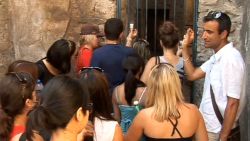Beaches strewn with waste, wild campers destroying fragile habitats, warnings from an increasingly overstretched Coastguard, unaffordable accommodations. What was supposed to have been a Great British summer has, for many, become a staycation nightmare.
Cut off by quarantine regulations from cheap trips to popular overseas destinations, UK vacationers were encouraged by Prime Minister Boris Johnson to enjoy their own, sometimes overlooked, holiday hotspots when Covid-19 lockdown measures eased in July.
Brits have also been permitted to venture abroad, with those traveling to countries identified on a coronavirus “safe” list exempted from quarantine on their return.
But with Spain, which usually attracts 18 million British tourists each year, hastily withdrawn from the list because of a virus resurgence and France, another popular destination, being dropped from the list this weekend, the demand for UK holidays has skyrocketed.
Research by hotel group The Cairn Collection found there was a 532% growth in searches for trips to Scotland, with searches for trips to ever popular Cornwall up 325% year-on-year.
Johnson, who himself is said to be planning a two-week stay in Scotland, has advised people to visit “peerless, wonderful, superlative places in the UK,” rather than heading abroad.
The result has been clogged roads, emergency incidents on the most popular stretches of coastline, a rise in travel scams and soaring prices for accommodation.
Leave no trace
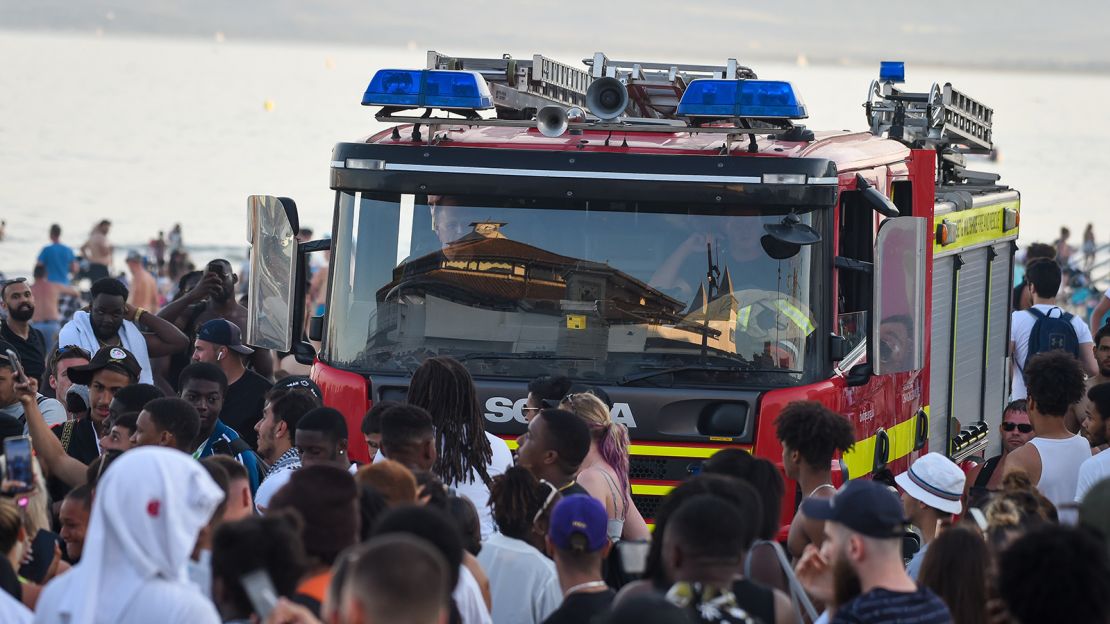
Even before peak summer was underway, there were signs of trouble.
When the last weekend of June saw the UK swelter in a 30 C (86 F) heatwave, an estimated half a million people headed to Dorset, a coastal region in southern England, as lockdown restrictions frayed.
Emergency services in the Dorset resort town of Bournemouth declared a major incident. The local council issued a record 558 parking fines. A massive 33 tons of waste were collected along the Dorset coastline, including human excrement and soiled diapers.
Further east, in the popular coastal city of Brighton, a place similarly blighted by alarmingly sized crowds leaving behind piles of trash, concerned residents began taking matters into their own hands.
“I finally snapped watching the rubbish and bins overflow,” says Coral Evans. She’s founded a group, Leave No Trace Brighton, that engages with locals on Instagram to coordinate near-daily beach cleanup operations.
“Brighton has always had an issue with beach visitors leaving rubbish, but at the end of June, the seafront became a destination for people coming out of lockdown,” she says. “As the masses descended, the rubbish being discarded on the beach increased exponentially.”
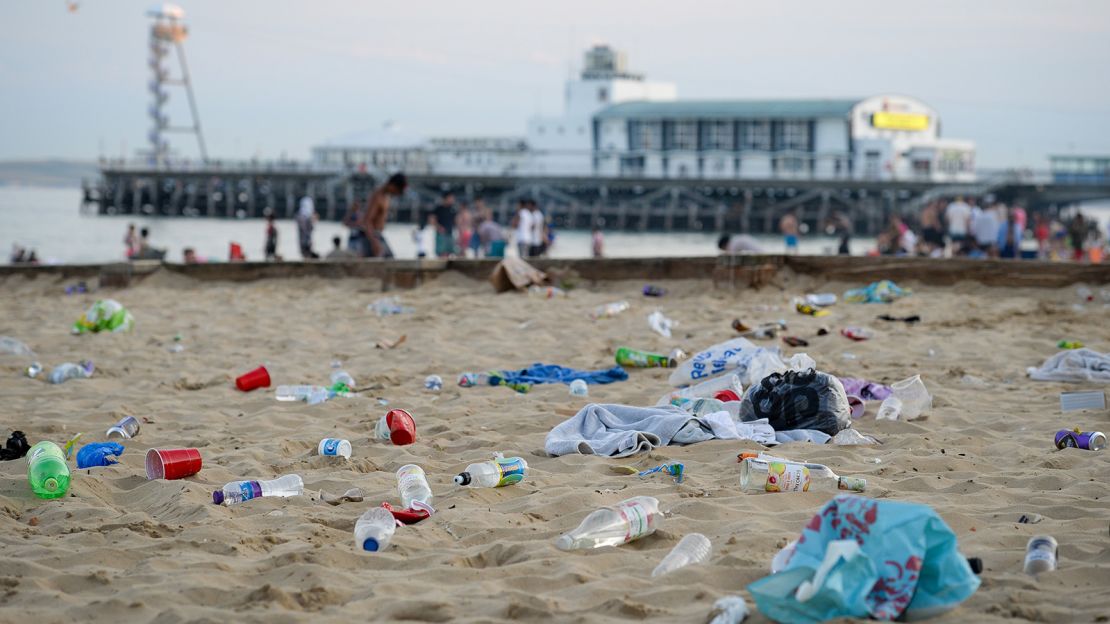
On June 27, the council’s beach cleaners collected 11 tons of waste between the waterfront’s two piers, a stretch of around half a mile.
Whenever there’s a sunny day, waste on the beach is a “perpetual problem,” says Evans.
Because of its proximity to London, Brighton has around 12 million people just one hour away from its famous beach.
But on weekends throughout July and August, the city’s council was forced to issue warnings telling anyone who wasn’t already in the city not to travel there.
Trains were so busy that social distancing wasn’t possible and crowd control measures had to be introduced at the train station. New spot fines of £150 (nearly $200) for leaving waste have been introduced, but Evans says it’s hard for the council to enforce.
“With thousands of beach visitors everyday, and only a handful of environment enforcement officers, they really are up against it.”
High prices
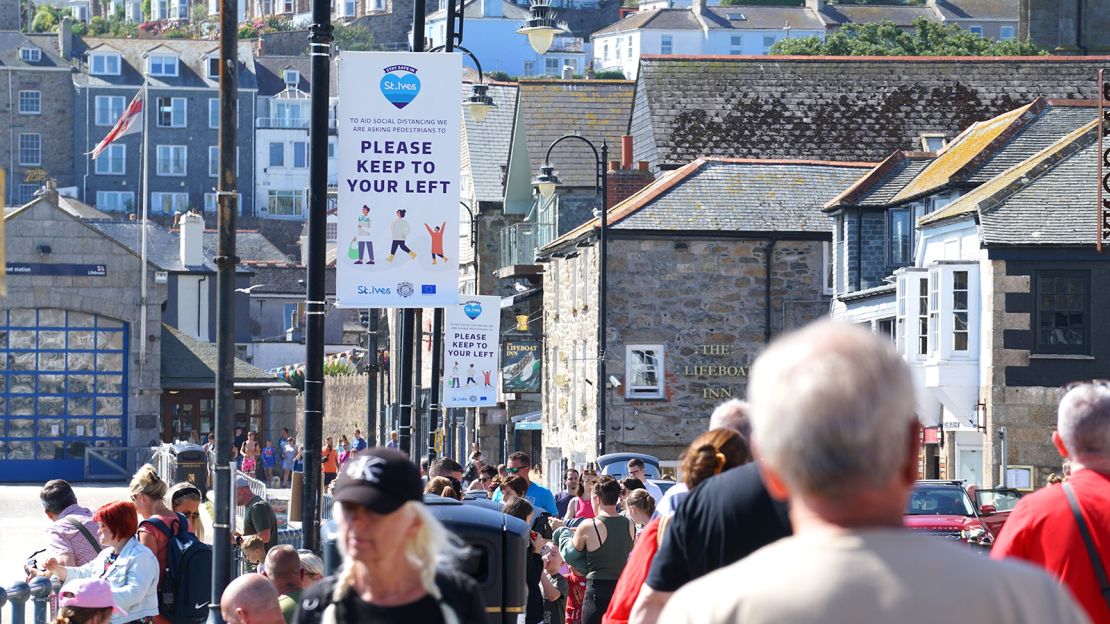
As staycation demand rose, scammers also swooped in to try to take advantage of those looking for a break close to home.
UK Finance, the country’s banking industry body, warned in June that fake listings for motorhomes and caravans were being used to try to target unsuspecting holidaymakers. Fake PayPal accounts were reportedly used to dupe consumers out of cash.
More common complaints, however, have focused on a lack of availability of accommodation, as well as hefty price increases.
Business consultant Lizzie Benton said she had planned to take her family on vacation to Norfolk, a rural region in eastern England that typically offers uncrowded coastlines.
“When we tried looking for Airbnb places to stay, many of them were completely booked up until October,” she says.
“When we looked at hotels, we found again that either they were fully booked or had driven up their prices. One place where we stayed last year had gone up by more than £50 per person.”
It’s not just those looking to book this year that have been affected by price rises.
Jason Parker and his family were all shielding up until early August, meaning they could not leave home until then.
“Due to mistrust and what we have seen on the news, we canceled all our holidays this year, but we have seen the cottage we were going to stay in this year has increased their price from £480 to £950 for the same week next year!”
There’s also widespread concern about people traveling last minute in the hope of finding a cheap deal and lots of vacancies.
“We’re saying very strongly, ‘book accommodation before you come’,” says Malcolm Bell, CEO of Visit Cornwall. “We’re not saying we’re full, but you’ve got to book.”
‘Wild camping’
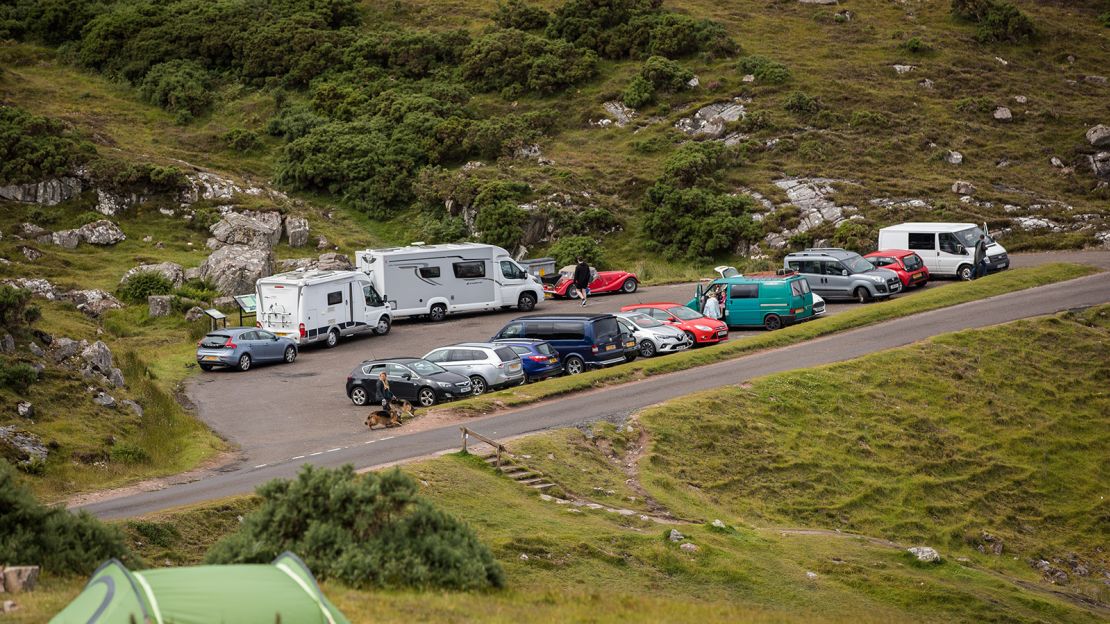
While demand for self-catering accommodation and hotels has risen, there has been even greater interest in camping.
More affordable and potentially safer from coronavirus, the boom has seen tent sales rise 126% according to price comparison service Price Spy. However, this popularity has seen many official campsites booked out for summer, leading some to try their hand at so-called “wild camping.”
In the Lake District, a national park in northwestern England, authorities spoke to 200 people wild camping on one night in late June, including 20 people having a party on the summit of Catbells, one of its most popular mountains.
One park ranger even revealed he’d had to move on campers who had pitched tents in a dry reservoir on the evening a storm was forecast. As on beaches, campers were found to have left behind litter, with some even smashing up wooden fences for firewood.
“Wild camping is legal in Scotland and parts of Dartmoor National Park, but everywhere else people are supposed to ask permission of the landowner,” explains Phoebe Smith, author of “Extreme Sleeps: Adventures of a Wild Camper.”
“It is tolerated in high areas in national parks and by coasts and rivers, as long as you do it ‘properly.’ That means arriving late, leaving early, taking everything with you including your rubbish and being respectful of others.”
Smith says the scenes from throughout the summer in the Lake District and parts of Cornwall are not, in fact, wild camping, which involves taking minimal kit and going to remote places. Rather, it’s people camping on roadsides with large tents, stoves and environmentally damaging disposable barbecues, with some leaving everything behind.
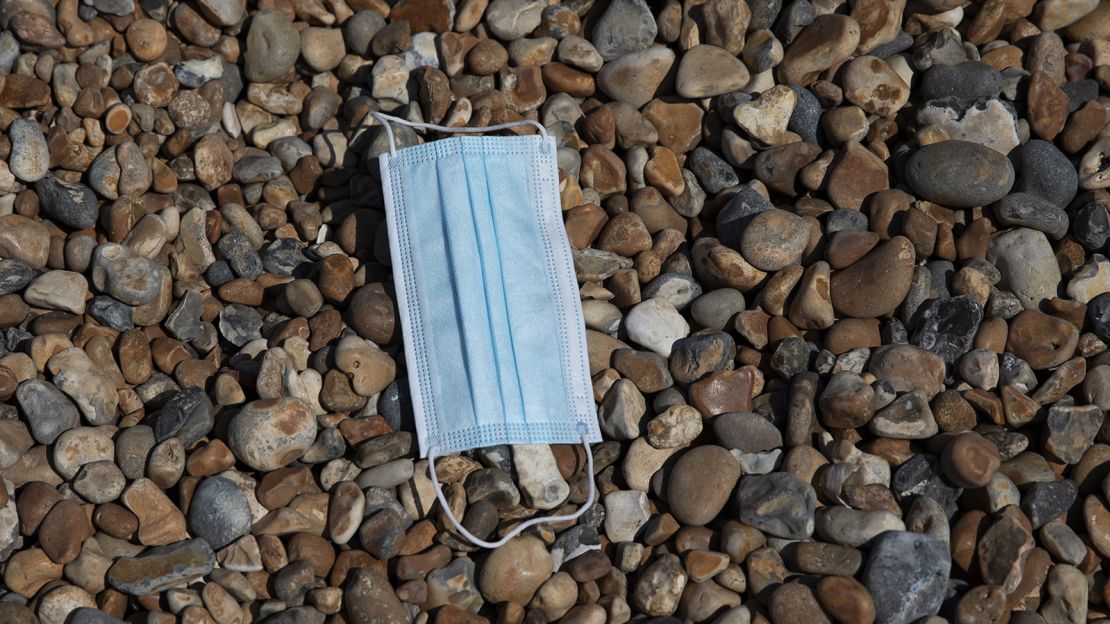
“What we’ve seen is basically fly tipping (illegal waste dumping) with camping equipment,” she says.
Stuart Burgess from government woodland management body Forestry England has dealt with illegal camping in Kielder Forest in northern England. He outlined a series of similar problems that his organization has encountered this summer.
“There’s been damage to the forests and individual trees, including digging for campfires and toilets to uncontrolled fires from campfires or barbecues.
“Pollution and harm to wildlife can come from litter, including discarded equipment, as well as people openly going to the toilet. Irresponsible use of alcohol and drugs can make matters worse, including driving vehicles in the forest. It’s also important to remember the worry and disturbance it can cause to rural communities.”
For all these issues, Smith says at the heart of the problem is a lack of clear communication from politicians.
“People are told by the government to go to these places and spend money, that it’s their duty to help save the economy, but they’re traveling with no guidance,” she says.
“Rather than barrack people, we should empower them and explain why that kind of camping is bad, why we should look after places, and why it’s better to take minimal kit and go really far away. There are so many mixed messages, people are stir crazy and want to get out, but the government needs to say how to do it and do it responsibly.”
Dealing with huge crowds
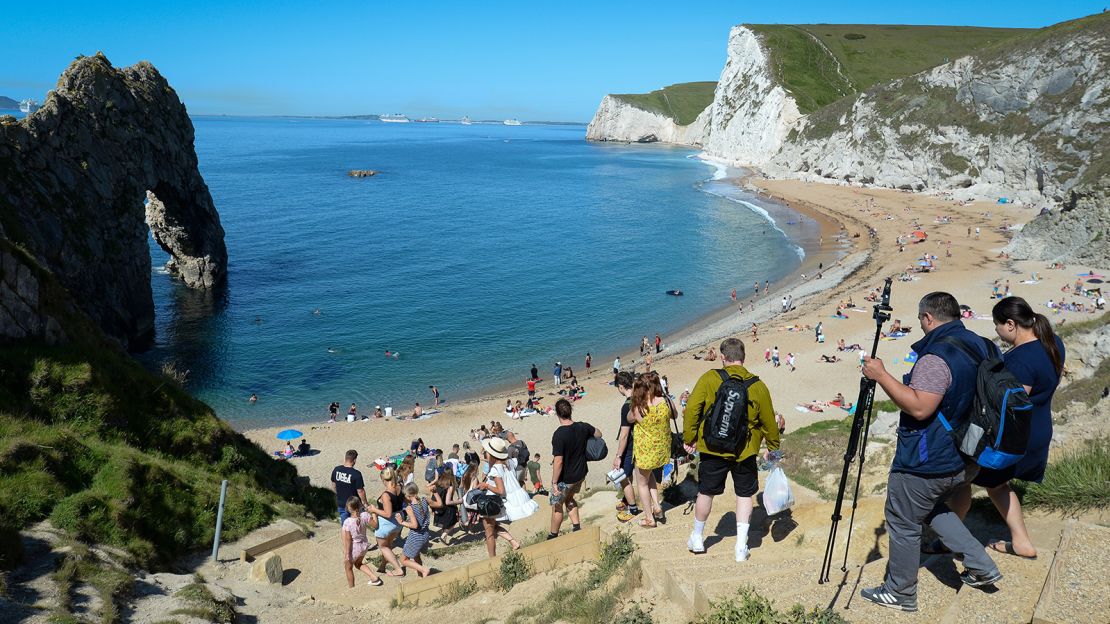
The communities that Burgess mentions, especially in popular tourist areas, are also understandably wary about the influx of visitors causing a rise in Covid-19 cases.
This is particularly true in Cornwall, which has seen thousands of visitors since lockdown rules were relaxed.
“We’re the third lowest place for Covid in the country,” says Malcolm Bell of Visit Cornwall. “That actually makes people more nervous,” he adds, referring to locals concerned about infection rates rising.
While Bell says visitor numbers are down about 30,000 compared with an average year, there are still around 150,000 visitors in Cornwall on any one day. That’s on top of a local population of 530,000, many of whom have not gone away on holiday.
“Because it was so quiet during lockdown, it’s been a bit of a shock,” he says. “Normally you’d build up numbers slowly from March through to April and May. Whereas what happened was we went from 0-90 in three seconds.”
Bell adds that with social distancing measures in place, places can seem busier as visitors and locals try to maintain physical distancing.
The places where it’s still possible to escape
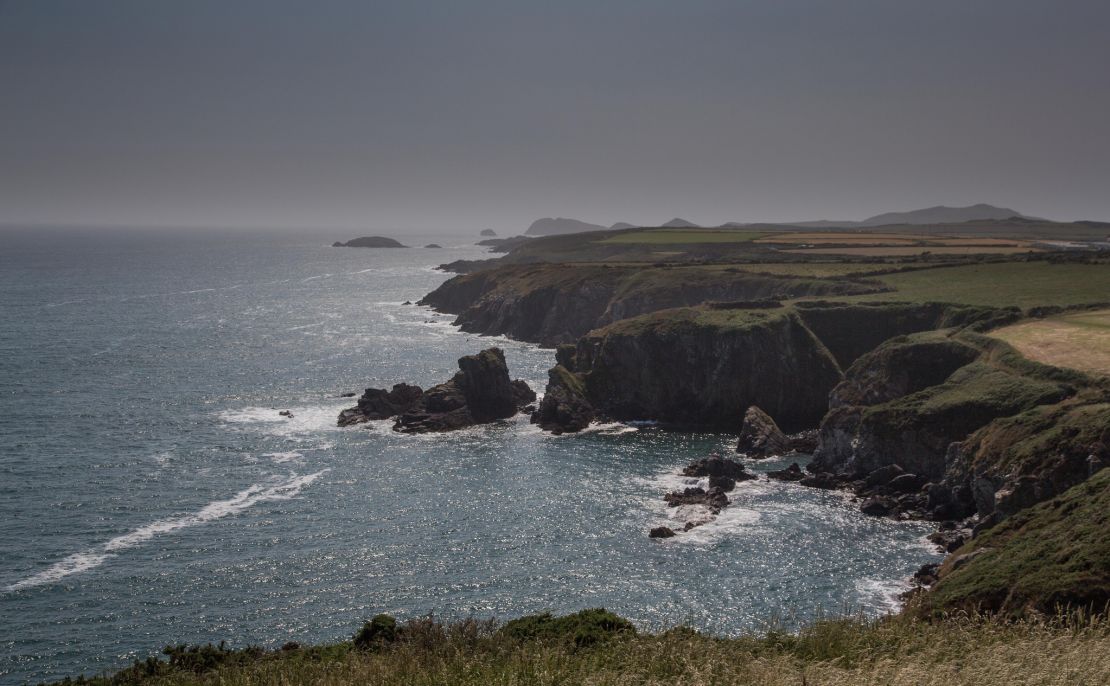
Despite this, there are pockets of the UK where it’s possible to have a quiet and uncrowded break. Even in Cornwall.
“We’ve got about 400 beaches, but there are about 10 famous ones,” says Bell. “Now’s not the time, certainly at the weekends, to be heading to them. Save your Instagram shots for next year. We keep wanting to get across about the sheer number of beaches. If you’re able to walk 15 minutes downhill, you can find plenty of space.”
Bell is also trying to push Cornwall as a winter destination. He says he’s concerned that many people are trying to cram a break in before a potential second national lockdown, a prospect the UK government has downplayed despite new cases hovering around 1,000 a day.
Cornwall will be quiet in the colder months, Bell adds, meaning plenty of room to spread out and good prices too.
Tour operators are also trying to push far-off destinations within the UK as an alternative to more exotic climes. Much Better Adventures, which usually offers trips to the Carpathian Mountains in Romania and epic hikes in the Moroccan Atlas, has refocused its attention on small, socially distant trips within the UK.
“We’re seeing that of all of our remote UK adventure holidays, the most popular at the moment are those in Wales and the Scottish Highlands and Islands,” says founder Sam Bruce.
“The Pembrokeshire Coast National Park in Wales is fantastic for hiking, kayaking and wild camping, as are the many lochs and glens in Scotland, and if you really want to get away from it all, you can’t get much more off-grid than a castaway weekend on an uninhabited Scottish Island.”
England's most beautiful destinations
There’s also been a push toward more local, low carbon breaks, using innovative travel such as bike-packing. This involves strapping a small tent and camping equipment to a bike and heading off into the countryside close to home, perfect for younger and fitter types not too keen on sitting in the car on a sweltering motorway or braving the crowds on trains to the south coast.
“Bike-packing enables people to find hidden spots and get away from the crowds, while keeping fit and traveling with everything they need,” says Luke Green from Red Original, an outdoor equipment company. Green says that they’ve seen a surge in interest following a growth in bike sales during lockdown, with reports of epic trips around the quiet lanes of the Isle of Wight.
“It’s becoming such an accessible means of travel as much of the kit is so much smaller – meaning a tent packs down neatly into a small backpack and other kit has multiple uses, so you don’t need masses of stuff.
“People don’t necessarily have the space or the money to buy loads of different products so they want half a dozen things that are fit for many different purposes, like a bike pouch that doubles up as a waterproof storage unit for keeping mobiles, keys and wallets completely safe and watertight even when submerged in a meter of water.”
While such activities are certainly niche, they do show that escaping the crowds without having to board a flight and risk 14 days of self-isolation when getting back to the UK is possible.
One thing’s for certain though – heading to the UK’s south coast or its busier national parks is unlikely to afford the sense of escape that so many crave after months of sitting at home growing bored.






